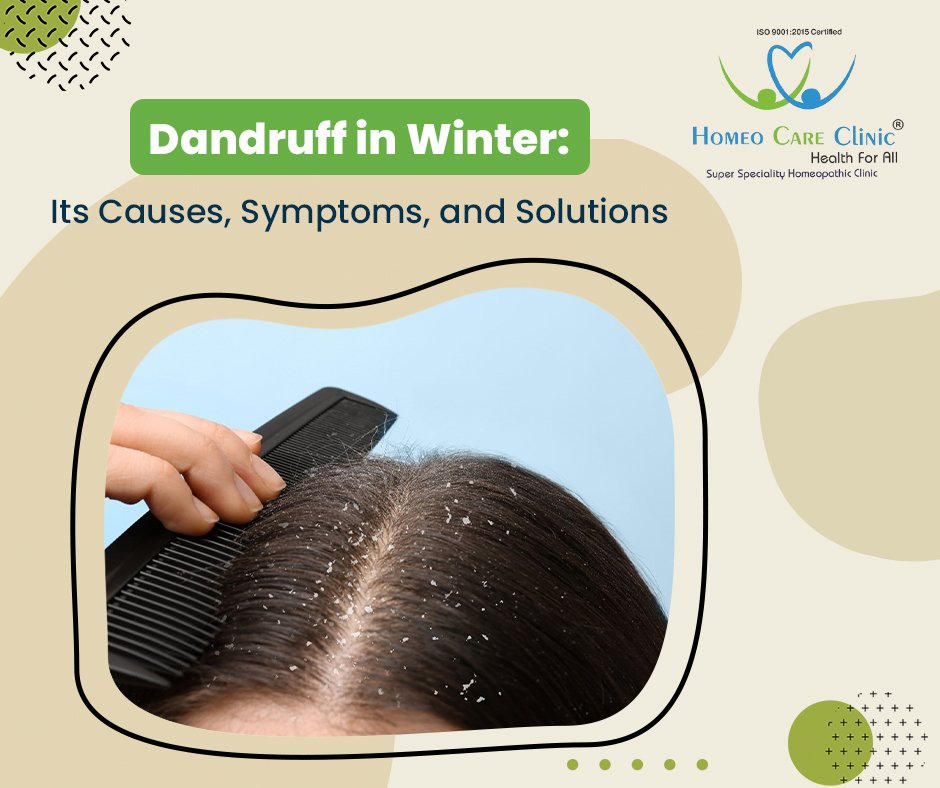Dandruff in Winter: Its Causes, Symptoms, and Solutions
Winter may bring cold weather, cozy sweaters, and hot chocolate, but it can also make your dandruff worse. This seasonal woe can affect your scalp and make it feel uncomfortable, dry, and itchy. If you are wondering why your dandruff seems to worsen in winter or how to avoid it, you’re not alone. In this blog, let’s explore the causes, symptoms, and some effective remedies for dandruff in winter.
Dandruff in Winter: How Winter Causes Dandruff
Dandruff is related to Seborrheic Dermatitis, which causes itchy and flaky skin, but it only occurs on the scalp. The biggest sign of a person having dandruff is the patches of white flakes that are made up of dead skin on the scalp. While most people focus on the flakes, itching may be the most uncomfortable sign of dandruff. Flakes and an itchy scalp are the two main symptoms of dandruff. It typically accumulates in your hair and shoulders and often gets worse during winter when the air is dry. Dandruff gets worse in winter because the air is cold and dry, which makes the scalp lose moisture faster. A dry scalp triggers our body into producing more oil for protection, which worsens the dandruff.
Causes of Dandruff in Winter
During winter, both indoors and outdoors, the air is generally dry, which tends to be drying on the scalp. The scalp becomes irritated and begins to flake more skin cells than usual. Another major contributing cause of dandruff in winter is the excessive use of indoor heating. Indoor heating systems tend to dry up the air even more, which causes dryness on the scalp. Wearing hats and scarves can also promote dandruff as they tend to trap heat and sweat, creating an environment that is conducive to the growth of Malassezia, one of the most common causes of dandruff. Washing your hair less in winter can lead to a buildup of dirt, oil, and microbes, making your dandruff worse. Washing your hair with hot water and then stepping out in the cold can confuse your scalp’s oil balance, leading to dryness and flaking.
How to Avoid Dandruff in Winter
You can’t control the cold and chilly weather, but you can follow some steps to avoid dandruff in winter to increase. Here’s how you can avoid dandruff in winter:
- Wash your hair regularly with a mild, anti-dandruff shampoo
- Use lukewarm water instead of very hot water to wash your hair
- Drink enough water throughout the day to keep your body and scalp hydrated
- Limit using heat styling tools and use a heat protectant if needed
- Apply nourishing oils like coconut or argan oil to nourish your scalp.
How to Prevent Dandruff During Winter
Looking for ways to prevent dandruff during winter? Prevention is better than a cure. Try these tips to stop your dandruff from flaring up when the temperature drops:
- Choose a moisturising anti-dandruff shampoo: Look for two important things in your winter shampoo: that it is effective against dandruff and has active ingredients that protect your scalp from the effects of the dandruff-causing microbe.
- Wash your hair frequently: Wash your hair in lukewarm water 3 times a week or more. The more you use your anti-dandruff shampoo, the better effect it will have on your scalp.
- Don’t scratch: Scratching rigorously can damage your skin and make the flakes even more visible. Instead, press your fingers against your head when it becomes too itchy.
- Avoid things that can make your scalp dry: Indoor air can make the scalp dry. Instead, use a humidifier to keep your scalp moisturised.
- Wear breathable hats: while wearing a hat can help to keep you warm, it is important to choose one that is made from breathable fabrics that allow air to flow.
- Stay hydrated: Hydration is very important for our overall health. Drink plenty of water, around 8-10 glasses daily, to prevent dehydration.
- Maintain a balanced diet: Maintaining a balanced diet with adequate protein and micronutrients is important for hair growth. Include a variety of nutrient-rich foods in your diet, such as fruits and vegetables, lean proteins, and healthy fats. Hair health requires nutrients such as vitamins A, C, D, and E, biotin, and iron. Consult a healthcare professional or a nutritionist for personalised dietary advice.
- Stress management: Stressful circumstances may cause excessive sweating. Practice stress-reduction strategies like meditation, exercise, deep breathing, or engaging in hobbies to help lower stress levels, which can help the health of your hair inadvertently.
How to Reduce Dandruff in Winter
Mild dandruff can be treated using a gentle shampoo to reduce the buildup of oil and skin cells. Always use a conditioner after washing your hair, especially if you have dry hair. Medicated and non-medicated hair products in the form of gels, oils, sprays, foams and creams can act as effective treatments against dandruff in winter. Choose a gentle dandruff shampoo that contains one or more ingredients like selenium sulfide, pyrithione zinc, salicylic acid, and ketoconazole, which help to treat dandruff. Tar-based shampoos have antibiotic and antifungal properties, which are effective in treating dandruff.
Remedies for Dandruff in Winter
If you’re at risk from environmental factors in the winter, there are some simple steps you can take to protect your hair and scalp from dandruff in winter:
- Apply argan oil to your hair and scalp to create a moisture barrier to the environment. This can prevent your scalp from drying out, and the oil’s anti-inflammatory properties can soothe your itching.
- Tea tree oil is an essential oil that is antifungal and antibacterial. It can moisturise your head and soothe any itching.
- Avoid using hair products that contain alcohol-based ingredients. In the cold weather, these elements can dry out your head and eventually lead to dandruff.
- Use an aloe vera mask to bring back the moisture to your scalp and clear up any oil buildup. It is a great way to get rid of dandruff in winter and nourish your hair.
- Gently rub baking soda into your scalp in the shower and rinse after a few minutes.
- Mix ¼ cup apple cider vinegar with ¼ cup water. Apply this to your hair for 15 minutes to 1 hour and rinse. Do this twice a week to get rid of dandruff.
- Rub 3 to 5 teaspoons of coconut oil into your scalp and rinse. Then rub one more teaspoon mixed with 1 cup of water. Do this every day to effectively get rid of dandruff in winter.
Why Dandruff Occurs in Winter: The Reason for Dandruff in Winter
Since excess oil and fungus are the main reasons for dandruff, you can identify the various factors in the colder months that make your dandruff worse. These reasons include:
- Dry scalp
- Wearing a hat
- Washing your hair infrequently
- Sudden change in temperature
- Stress
- Indoor heating
- Heat styling
Conclusion
Winter can make your dandruff worse, making you feel uncomfortable and affecting your confidence in wearing dark winter clothes. You can manage dandruff in winter by taking mild hot showers, using oils along with the right anti-dandruff shampoos, wearing breathable hats, and avoiding scratching your scalp. At Homeocare Clinic, we are dedicated to providing our patients with the best quality and personalised treatment plans tailored to fulfil their specific requirements. Our experienced team of dermatologists offers safe, natural, and highly effective solutions to promote the regrowth of our patients’ hair. Contact us now for the best hair treatment in Pune.

